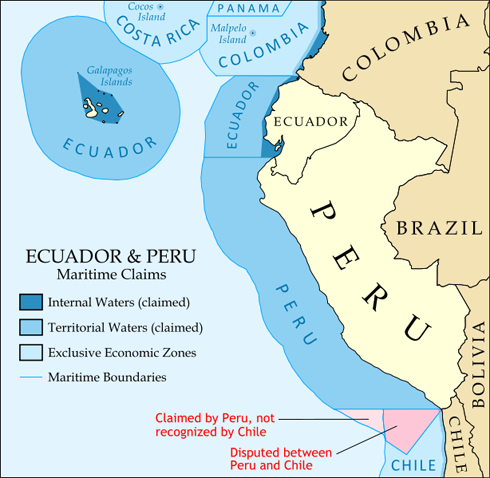
International boundaries are often blurred by the processes of globalization, but in South America some maritime borders remain contested. For instance, Chile and Peru, neighbors that have enjoyed sustained economic development over the past few years, remain at odds over approximately 38,000 square kilometers of sea located along their maritime border.
Bilateral negotiations between the two countries were first held in 1980 but no agreement was reached. In 2008, Peru took the case to the International Court of Justice (ICJ) which, in turn, considered the issue at a public hearing in December 2012. The ICJ is expected to make a ruling on the dispute in mid-2013.
In the meantime, Peru continues to argue that the maritime border has not yet been defined by any agreement, with documents signed in the 1950s only relating to access to fishing grounds. Lima also claims that maritime limits should run diagonally south-west from the land border.
Meanwhile, Chile argues that the maritime limits were agreed upon after the signing of treaties in 1952 and 1954. These infer that the maritime border should run parallel to the Equator line, an arrangement that Santiago claims Peru has respected for the past 60 years.
Supporting the Chilean position, netizen Juan Vargas commented on Peru this Week:
The 1952 and 1954 agreements clearly indicate and establish a Maritime Boundary [between Chile and Peru]. They can be found translated into English at: http://www.state.gov/documents/organization/58820.pdf”
Oscar Maúrtua de Romaña, a former Peruvian Minister of Foreign Affairs, describes the arguments of both sides in a blog post on El Mirador, and concludes:
Despite historical differences, Peru and Chile share a common destiny. A fair outcome by the court will end the “sole remaining border issue” which compromises our bilateral relations. It is reassuring that 72 hours before the start of the hearing (Peruvian) President Humala and (Chilean) President Piñera have made a joint statement in which both pledged to accept and follow the determination of the International Court of The Hague.
Landlocked Bolivia Awaits Decision
The dispute between Chile and Peru also has direct implications for other states around the region. In particular, Bolivia is closely watching legal proceedings, and has previously stated [en] that it plans to make a case at the ICJ for Chile to provide coastal access to the Pacific that was lost during the 1879-1881 war between the two countries. The final outcome at the ICJ case may add further impetus to Bolivia’s attempts to seek a diplomatic solution to this longstanding issue.
Regardless of the ICJ resolution, the democratic and diplomatic statements made by all parties have significantly reduced the risk of armed conflict. This has, in turn provided the foundations for the development of more creative solutions aimed at ending the crises. These include “A Maritime Zone of Bilateral Participation” proposed by Jilmar Moisés Córdova. This argues:
The maritime dispute between Peru and Chile, can reach a possible solution by a so-called Maritime Zone Bilateral Involvement or Participation, which divide the seas of the two states and would be intended for fishing, […] the exploitation of resources by boats of a certain tonnage from both Peru and Chile. For instance, Argentina and Uruguay hold a treaty like this so that delimits their sovereign seas.
Córdova also considers that such an alternative could give both countries the chance of exploring and benefiting from mineral, oil and other resources. He is also confident that the Maritime Zone Bilateral Involvement could provide alternative options for Bolivia’s coastal aspirations.
For additional reading on this topic please see:
Resource Conflicts: Emerging Struggles over Strategic Commodities in Latin America
‘Local Governments and Rural Development: Comparing Lessons from Brazil, Chile, Mexico, and Peru’
Latin America’s Security Challenges Two Centuries On
For more information on issues and events that shape our world please visit the ISN’s featured editorial content and Security Watch.


One reply on “Stormy Waters? The Maritime Border Disputes between Bolivia, Chile and Peru”
Let’s see if both presidents will really accept silently once we know the verdict. In a similar casein November last year (maritime border dispute between Colombia and Nicaragua) Colombian exponents started to complain and questioned the adherence to the ICJ after the ruling, which wasn’t entirely to their favour. There were also protests on social media and even on the streets.